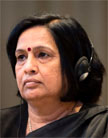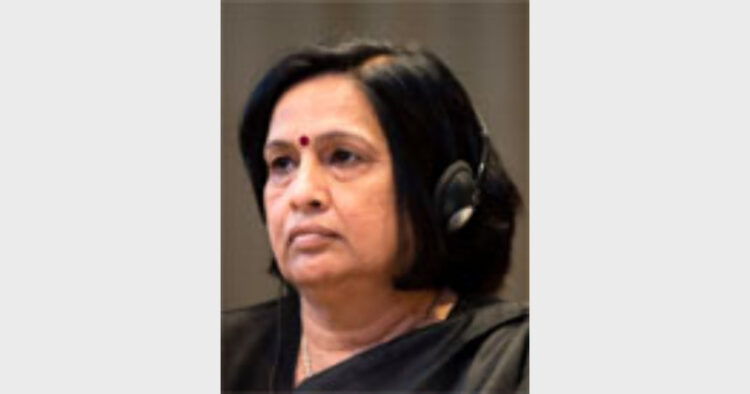 Neeru Chadha won the crucial election to the International Tribunal for the Law of the Sea, becoming the first Indian woman appointed as a judge at the tribunal for a nine-year term from 2017 to 2026
Neeru Chadha won the crucial election to the International Tribunal for the Law of the Sea, becoming the first Indian woman appointed as a judge at the tribunal for a nine-year term from 2017 to 2026
Puhazh Gandhi P
The recent successful nomination of Neeru Chadha as Judge of the International Tribunal for the Law of the Sea (ITLOS) and re-nomination of Justice Dalveer Bhandari evince the determination of the present government to view international settlement of disputes seriously.
It would be the general perception that the Italian Marine case before the ITLOS between Italy and India and the case of Kulbushan Jadav filed by India against Pakistan have prompted Indian policy makers to take seriously the need for proper representation in International dispute settlement bodies. This is a laudable effort, which will have the international institutions and the concept of rule of law strengthened. In fact, the said representation is what India had failed to achieve under its previous governments.
India and International Law
Needless to say, India has been an active player in the field of international law from its inception. India is a signatory and a party to almost all the important international organisations. In the past, India has relied upon international dispute settlement mechanisms like International Court of Justice (ICJ), ITLOS, International Civil Aviation Organization (ICAO), though the legal fraternity in India still believes in the Austinian theory that International Law is a “vanishing point of jurisprudence” (International law is not a law in the sensustricto), blindly relying only upon the skills and abilities of the negotiating diplomats which has undoubtedly led to weakening of India’s participation in international dispute settlement bodies.
In fact, international law is nothing but a set of rules established by custom or by treaty (agreement between the member states) which are voluntarily accepted by the states and considered as binding on them. Unlike a domestic law which, in the words of Austin, is a “Command of a sovereign to the subject”, International Law is a result of compromise and adjustments between sovereign states which are not answerable to any high command but to their own consciousness and the collective opinion of the international community. That is one of the reasons why international law is not considered as a law in the strict sense.
However, with the advent of globalisation and increase in cross border trade, nations felt the need for rules of
engagement which govern their transaction with their
counterparts. However weak the rules may be, they gained importance, as diplomacy was not able to resolve the issues— and when diplomacy tends to weaken or couldn’t obtain the expected results, these rules of engagement
provide support to diplomacy. Thus dispute settlement
bodies like ICJ, ICAO, and ITLOS gained prominence, whatever are the weaknesses of International law. In other words, the complexities of global interactions started transforming international law from a relatively weak law to a considerably strong law, though the strength couldnot be equated to that of the domestic law which emanates from a sovereign and that which is backed by sanctions.
Engagement with International Institutions
Since International law is considered weak, previous Union Governments believed that the international dispute settlement mechanisms would not yield the desired results and thus paid little importance to these mechanisms.
When Smt Vijayalakshmi Pandit was nominated by India in 1953 to the United Nations General Assembly (UNGA), the successive governments could get very few Indians re-elected to such coveted positions until the recent trend started with the election of Anirudha Rajput to International Law Commission (ILC) and Neeru Chadha to International Tribunal for the Law of the Sea (ITLOS). Pandit’s nomination to UNGA mainly owes to the fact that she was related to the then Prime Minister of India Jawaharlal Nehru, and Nehru required parking slots for his warring family members and used these international institutions as berths for them.
Similarly, in 2011 when Japanese Judge Hishashi Owada retired, leading to an Asian Vacancy, the corruption ridden UPA Government failed to even nominate a candidate for ICJ Judgeship as the Government was busy firefighting its corrupt Ministers. After much furor, Justice Dalveer Bhandari of the Supreme Court was nominated by the Government of India. The Government of India got him elected to ICJ on a casual vacancy which was for a remainder of 6 years as against the regular term of 9 years for any ICJ Judge.
However the recent cases of Italian marines in ITLOS and of Jadhav in ICJ reinforced the strength of International Law in international politics. The Government in no time grabbed the opportunity and ensured the election of Anirudha Rajput to ILC, Neeru Chadha to ITLOS, Alok Sekhar to ICAO and re-nominated Justice Dalveer Bhandari to a second full term for ICJ.
Though the Judges of International courts/tribunals cannot act on behalf of their nation, the presence of Indian nationals in these international dispute settlement bodies undoubtedly gives a comfort to the Indian negotiators to act firmly. Further it gives an impression in international diplomatic circles that India is taking international relations more seriously than ever before.
Needed Active Participation
Needless to say that the present Government is actively pursuing national interest in the international field. However lot more needs to be done. There are still many important
international positions which India should try and place its nationals. For example, India is not having representation in the Appellate Body Secretariat (Appeals Court) at the World Trade Organisation (WTO) after the retirement of A V Ganesan in 2008. India, though the largest democracy in the world, is not able get its national elected as the Secretary General of United Nations so far. India should ensure its presence in these important international bodies which will add strength to India’s international diplomacy.
(The writer is an international lawyer at Chennai-Former Visiting Expert Professional to International Criminal Court (ICC) at The Hague, The Netherlands)
Second InningIndia re-nominates Dalveer Bhandari for another term to the International Court of Justice judge Adv. Sayali Chandekar – Bhandarkar |














Comments